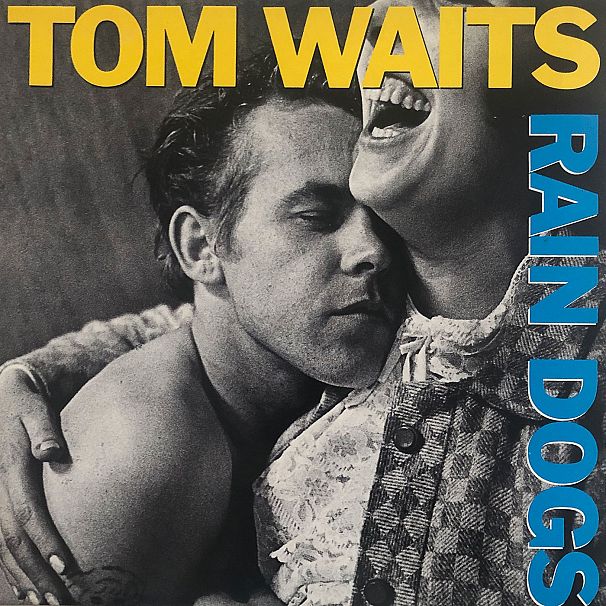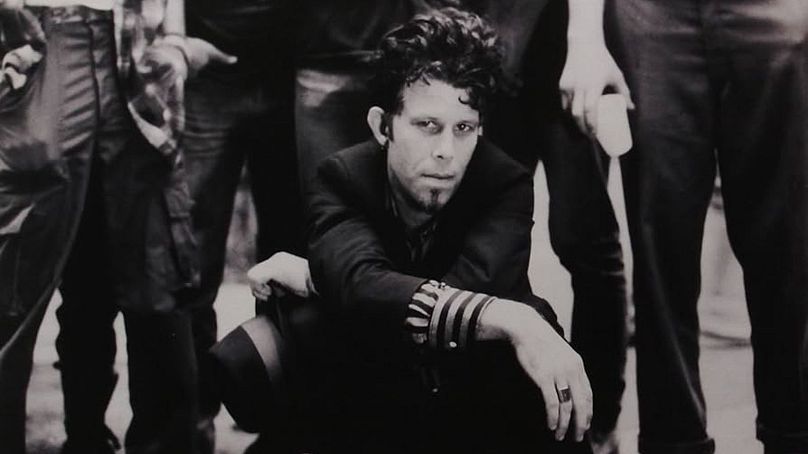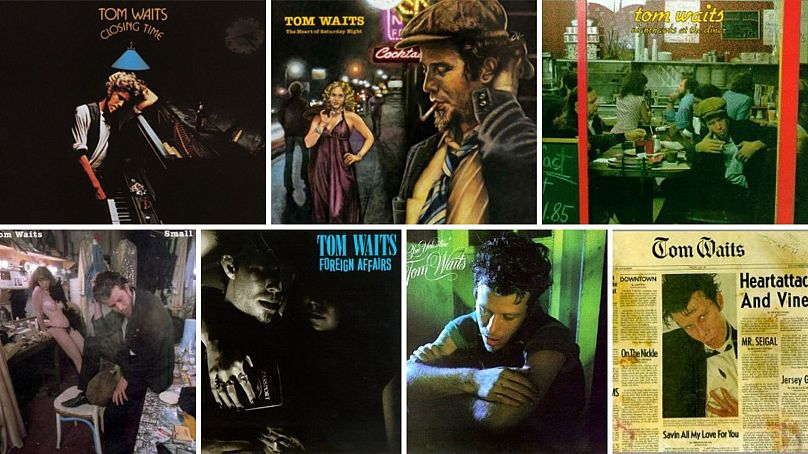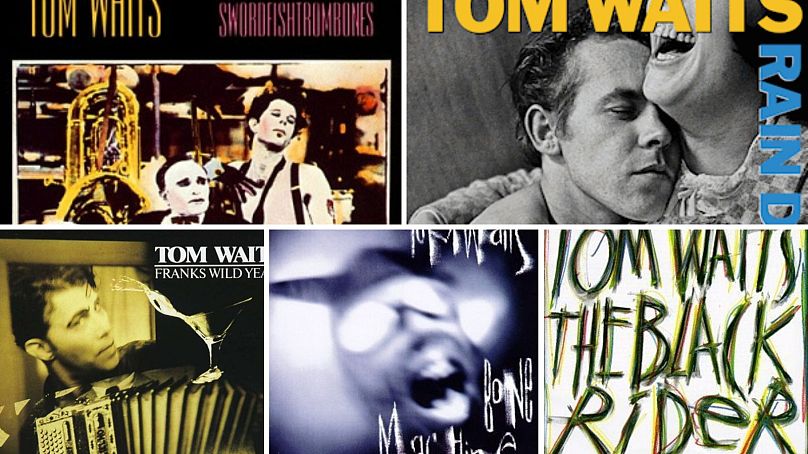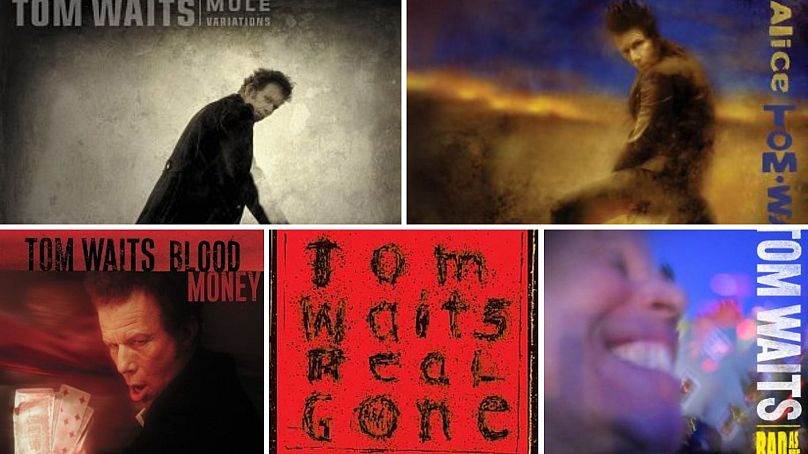‘Rain Dogs’ turns 40: Celebrating Tom Waits’ greatest album - and his unparalleled discography
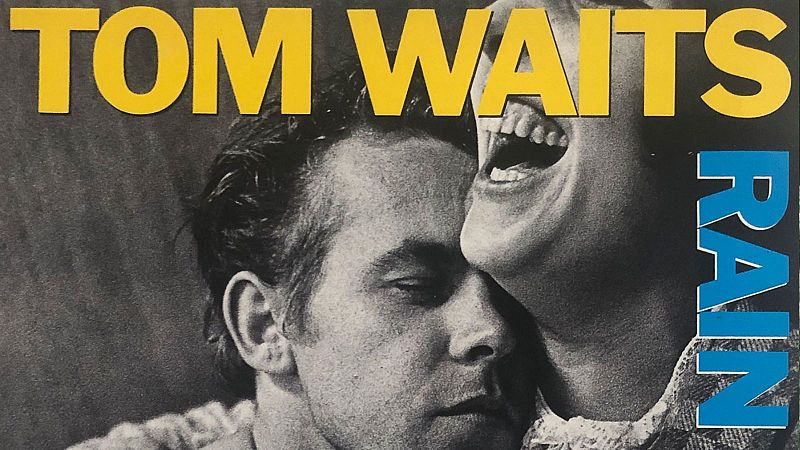
I was eight years old when I experienced my first Tom Waits song. It was like nothing I’d ever heard before.
Granted, at the age of eight, that wasn’t saying a lot, but the statement continues to apply to this day.
I can’t recall what went through my head when first listening to ‘Telephone Call From Istanbul’, a rhythmically buoyant song that seemed to be about broken glass, blue donkeys and never trusting a man in a blue trench coat. All I know is that I was open-mouthed, and nothing musical was ever the same again. Especially for my long-suffering mother, who would have to deal with me imitating Waits’ possessed, wolf-like howls whenever I entered a room.
Even now, she refers to Waits as the sound 'Woooouh!' as opposed to his birth name - both as a reference to my insufferable childhood antics but also, I suspect, to the fact that listening to a Tom Waits record is, for her, the equivalent of that scene from The Pink Panther Strikes Back when Herbert Lom dons the clawed gauntlet and goes to town on the chalkboard. Some apples do fall far from the tree.
Years later, I wandered about in my then-favourite music store, on a mission: I was looking to buy my first Tom Waits album.
At the time, I didn’t know his discography like the back of my hand and was searching for the album that featured ‘Telephone Call From Istanbul’. To my distress, I couldn’t find it and settled on the only record they had, ‘Rain Dogs’, not realising in the moment that it was the best buy I was ever going to make.
I mainlined the album again and again, completely drunk on Waits' gravelly growls, his ominous whispers, the carnivalesque musical accompaniments that enriched the stories of one-armed dwarves, millionaires shoveling coal and protagonists falling out of windows with confetti in their hair.
I couldn’t make my teenage peers get on board with my first full-on entry point into Waits’ discography. They just looked at me funny, as though I’d boorishly plonked a huge, whiskey-glazed hog roast onto the kids' birthday party table instead of a chocolate cake and yelled ‘TUCK IN!’
Regardless, I couldn't get enough. ‘Rain Dogs’ felt weird, abstract, wickedly funny and downright beautiful. Every listen widened my eyes further, leaving me bewildered at how romantic ballads, theatrical polkas, wild rumpas, jazz and poetry could crosspollinate so perfectly. It defied all characterisation, and I loved the album more because I couldn't describe its effect.
Sure, it didn’t contain ‘Telephone Call From Istanbul’, but I would eventually find that album...
Which brings us to today, a special day as ‘Rain Dogs’, like me this year, turns 40.
Since purchasing the album, I haven’t stopped feeding my undying devotion to Tom Waits; and now armed with many more music references, his 1985 album remains, to my ears, simply one of the greatest albums ever made.
It’s the one I recommend when asked for an entry point - which is no easy task when considering that this is the artist who has released some of the most fascinating and least compromising music of the last 50 years. Granted, it would be quite something to start at the beginning and be able to chronologically chart Waits’ evolution from barfly to musical Dadaist... But then I imagine someone listening to ‘Clap Hands’, ‘Jockey Full of Bourbon’, ‘Tango Till They’re Sore’ and ‘Anywhere I Lay My Head’ for the first time, and it makes me happy.
So, on 'Rain Dog''s 40th anniversary, it's as good a time as any to embark on the somewhat unhinged task of revisiting Waits’ shape-shifting discography (criminally bypassing his soundtracks, live albums and the epic Orphans series for the sake of already-discarded brevity) to celebrate not only my favourite album but the output of the most daring songwriter I’ve ever come across.
Here we go...
THE ASYLUM YEARS
Closing Time (1973)
A remarkable debut
Recorded in four weeks, Tom Waits’ debut album is a bluesy, piano-led collection of bittersweet love songs. At just 23 years old, he sounds like a wizened barfly – and embraces the part of a broken romantic, referring to himself as “old tomcat” in several songs. From ‘Martha’ to ‘Grapefruit Moon’ and album standouts ‘Ol’ 55’ and ‘I Hope That I Don’t Fall In Love With You’, this is a melancholic and effective journey into a low-light club in the early hours of the morning.
Listen to: ‘Ol’ ‘55’
The Heart of Saturday Night (1974)
A moody follow-up
Only one year after his debut album, Waits followed 'Closing Time' with a companion album that leans more into beatnik jazz, as well as Frank Sinatra and Jack Kerouac influences. It’s an earnest collection of booze-soaked nocturnal songs, with Waits showing that he has a keen eye for stories centering on outsiders longing for a connection, lovesick down-and-outs stumbling their way into Sunday morning and yearning for those roads not taken.
Listen to: ‘New Coat of Paint’
Nighthawks at the Diner (1975)
A transportive hybrid
This is a strange one. Simultaneously a studio album and a faux-live record, ‘Nighthawks at the Diner’ was recorded over two days in the summer of 1975 at the Record Plant in Los Angeles, performed to an invited audience of record executives, friends and associates. Waits, backed by a quartet of seasoned jazz musicians, is in full showman mood: he's the charismatic entertainer, the cool jive-talker, the unpredictable kidder and the whiskey-soaked balladeer. Straight live album or live-in-studio experiment? Who cares when the end result transports you so vividly to a 70s jam session in a smoky jazz club.
Listen to: ‘Eggs and Sausage (In A Cadillac with Susan Michelson)’
Small Change (1976)
Masterpiece N°1
Tom Waits’ voice was getting gruffer on ‘Nighthawks at the Diner’, and ‘Small Change’ is when listeners get their first full taste of what would be his trademark ‘carnival barker’ mode. This was his darkest album yet, a gorgeous and frequently bittersweet collection of hangover songs filled with ramblings of wisdom. The lyricism here is poignant yet cutting, and there are so many highlights on this record: ‘Tom Traubert’s Blues (Four Sheets to the Wind in Copenhagen); ‘Bad Liver and a Broken Heart’; ‘Step Right Up’; ‘The Piano Has Been Drinking (Not Me) (An Evening With Pete King)’... This is Waits' first must-have recording.
Listen to: ‘Tom Traubert’s Blues (Four Sheets to the Wind in Copenhagen)’
Foreign Affairs (1977)
A film noir trip
‘Foreign Affairs’ is considered a bit of a letdown in Waits’ discography, a messy step backwards considering its predecessors. The truth is, however, that it’s not the dud many dismiss it as. And for his fifth album in the space of five years, kudos to Waits for making ‘Foreign Affairs’ sound different – like the smooth soundtrack to a film noir, with ‘Burma Shave’, ‘A Sight For Sore Eyes’ and the duet with Bette Midler, ‘I Never Talk To Strangers’ standing out.
Listen to: ‘I Never Talk To Strangers’
Blue Valentine (1978)
Storytelling brilliance
By 1978, Tom Waits had fashioned his unique sound and style, allowing his growls to take centre stage and refining his ballads by adding sultrier swagger to the maudlin mix. The sad romance is still there on ‘Blue Valentine’, as evidenced by a surprisingly effective cover of ‘Somewhere’ from West Side Story as the album opener; but things were getting stranger, with some of Waits’ most inventive songwriting yet. ‘Red Shoes by the Drugstore’, ‘Whistlin’ Past the Graveyard’ and ‘A Sweet Little Bullet From a Pretty Blue Gun’ are standouts, while ‘Christmas Card From a Hooker in Minneapolis’ is one of his finest moment as a storyteller – a seemingly optimistic number with a depressing and perfectly executed rug-pull.
Listen to: ‘Christmas Card From a Hooker in Minneapolis’
Heartattack and Vine (1980)
An underrated transition
Considered a transitional album, ‘Heartattack and Vine’ was Waits’ last on the Asylum label and final one produced by Bones Howe. You can hear that Waits was on the cusp of leaving behind the first part of his songwriting career – a moment that not only coincided but was directly influenced by him meeting and marrying his future songwriting partner Kathleen Brennan. But that doesn’t mean he wasn’t leaving one hell of a ‘Dear John’... The titular opening track is stunning, as is ‘Jersey Girl’ - a song about Brennan that was famously covered by Bruce Springsteen. The standout remains ‘Mr. Siegal’, with the memorable lyrics: “You got to tell me brave captain / Why are the wicked so strong / How do the angels get to sleep / When the devil leaves the porchlight on.”
Listen to: ‘Mr. Siegal’
THE ISLAND YEARS
Swordfishtrombones (1983)
Masterpiece N°2
From the very first notes of 'Swordfishtrombones', it’s clear that this is a new era for Tom Waits. New label, new producer (himself), new experimental direction. It’s the first chapter of Waits’ experimental 80s trilogy, and a departure point that would come to define the second part of his career. The album sees him expand his musical palette and fully transition from barfly romantic to full-blown surrealist. Everything breaks the mould here. The piano-based numbers are replaced by horns, organs, marimbas, harmoniums and glorious percussion, which all bolster Waits’ humorous and still very vivid songwriting. The result is a noisy and overwhelming carnival in which seedy narratives transport the listener into a Captain Beefheart fever dream full of whispers, howls and growls.
Listen to: ‘In The Neighborhood’
Rain Dogs (1985)
Masterpiece N°3
If, gun to your head, you must behave like a filthy heathen and only have one Tom Waits album in your collection, make it this one. But seriously, why would you limit it to one?? That thing probably isn’t loaded anyway.
Listen to: All of them. Repeatedly.
Frank’s Wild Years (1987)
The trilogy finale
Tom Waits and Kathleen Brennan wrote a musical called 'Frank’s Wild Years' based on a spoken-word track from 'Swordfishtrombones', featuring his character / alter-ego Frank O’Brien. It was staged by the Steppenwolf Theater Company in 1986, and the following year, Waits released this album based on the show. Subtitled “Un Operachi Romantico in Two Acts”, this is often overlooked as the lesser chapter in his 80s trilogy. It shouldn’t be, as its influence can't be understated. For instance, ‘Way Down in the Hole’ inspired Nick Cave’s ‘Red Right Hand’, before going on to become the theme to the HBO show The Wire, while tracks like ‘Hang on St. Christopher’ and ‘Telephone Call From Istanbul’ show Waits at the height of his powers. The album is challenging, and maybe not one you want as an accompanying soundtrack to a relaxing dinner... But it’s masterful nonetheless.
Listen to: ‘Telephone Call From Istanbul’
Bone Machine (1992)
Masterpiece N°4
After his nigh-on flawless trilogy, a terrific live album (‘Big Time’) and the soundtrack for Jim Jarmusch’s Night On Earth, Tom Waits took a break. And for his first album in a new decade, he wouldn’t give the listener much of one. 'Bone Machine' is a lot – an abrasive album that throws you head first into a morbid world, as evidenced by opener ‘Earth Died Screaming’. The theme of death is everywhere on this industrial-rock sounding effort, featuring guttural roars and junkyard percussions – including newly fashioned instruments with metal scraps and, allegedly, human bones. It’s a heavy but completely entrancing trip, with the only respite being ‘I Don’t Wanna Grow Up’ - a superb track which ended up becoming a hit for the Ramones in 1999. Again, ‘Bone Machine’ may not be ideal for a dinner party soundtrack - unless you really want to tell your guests you hate them – but it’s a masterpiece, no doubt about it.
Listen to: ‘Goin’ Out West’
The Black Rider (1993)
One for die-hard fans
Of all his studio albums, this one may be the hardest sell... For his final effort recorded for Island Records, Waits becomes the hellish ringleader of a morbid theatre production. Like ‘Frank’s Wild Years’, it was written for a play, directed by Robert Wilson and co-written by beat poet William S. Burroughs. Based on the German folktale Der Freischütz, it’s all Faustian bargains and grimness galore. It’s not necessarily an album you enjoy; more one you admire. That said, the first six tracks are great, as is the ballad ‘I’ll Shoot The Moon’.
Listen to: ‘November’
THE ANTI YEARS
Mule Variations (1999)
Masterpiece N°5
After a six-year break and another label switch, Tom Waits returned with arguably one of his greatest albums. After the harshness of ‘Bone Machine’ and ‘The Black Rider’, ‘Mule Variations’ has a bit of everything Waits excels at, all seamlessly interweaved to make this a truly compelling listen. There are raucous stompers (‘Big In Japan’), rustic blues ballads (‘Hold On), gorgeous melodies (‘Picture in a Frame’), sinister carnival numbers (‘Eyeball Kid’), pastoral hits about the commercialisation of faith (‘Chocolate Jesus’) and some of the most emotional songs since his Asylum years (‘Georgia Lee’). And just to make sure that his listeners knew he hadn’t gone soft in his old age, there’s the chillingly weird spoken word performance ‘What’s He Building?’ - a number about neighbourly paranoia which continues to resonate to this day.
Listen to: ‘What’s He Building?’
Alice (2002)
A dreamy trip
After winning the Grammy for Best Contemporary Folk Album for ‘Mule Variations’, Waits delivered not one but two releases on the exact same day in 2002. The first, ‘Alice’, is another album written for a play in collaboration with Robert Wilson. Focusing on Lewis Carroll’s obsession with Alice Liddell, the inspiration for "Alice’s Adventures in Wonderland" and "Through the Looking-Glass", ‘Alice’ is dream-like and jazz-inspired. Not that the strangeness is lacking, as the German cacophony of ‘Kommienezuspadt’ will startle you into submission; but this is the softer side of Waits out in full force.
Listen to: ‘Alice’
Blood Money (2002)
A hellish trip
If ‘Alice’ sounded balletic and oneiric, ‘Blood Money’ is the polar opposite – the feverish booking in a twisted double bill. This is Waits at his most diabolical, adapting the disturbing opera Woyzeck alongside Brennan and Wilson. And with song titles like ‘Misery Is the River of the World’, ‘Everything Goes to Hell’, ‘God's Away on Business’, and ‘Starving in the Belly of a Whale’, you can guess what mood he’s turned up in. If you’re looking to fully embrace a state of madness, this is the ideal accompanying score. However, while ‘Blood Money’ is unforgivingly bleak, you can hear Waits is having a blast in his horror show – and it’s a damn entertaining one at that.
Listen to: ‘God's Away on Business’
Real Gone (2004)
Masterpiece N°6
However anachronistic Tom Waits had been over the years, nothing prepared listeners for him to drop a hip-hop inspired beatboxing album in 2004. Featuring sultry grooves, turntables instead of pianos, beatboxing from Waits - who embraces a whole new set of vocal tics and roars - 'Real Gone' incorporates new influences without alienating core fans. The first half of the 72-minute racket is flawless and richly evocative; and while there are a few lulls in the second, the final track ‘Day After Tomorrow’ is incredible and one of the most directly political songs of his career. Mostly disliked by critics when it was released, this surprising and clatteringly vibrant album has aged to become his most worthwhile late-career effort.
Listen to: ‘Don’t Go Into The Barn’
Bad As Me (2011)
Pretty please not the last one...
Released seven years after ‘Real Gone’, this is Tom Waits’ most recent (and hopefully not final) studio album. It’s got plenty of bite, but not the same verve as his experimental forays, ending up sounding like a career retrospective. There are rowdy kickers (‘Bad As Me’); jazz-influenced numbers (‘Last Leaf’); troubadour callbacks (‘Kiss Me’); ‘Rain Dogs’-echoing tracks (‘Get Lost’); and vaudevillian élans (‘Hell Broke Luce’) - all coming together to form a taut and consistent whole. In the 14 years he’s been away from the recording studio, Waits hasn’t disappeared. He’s been acting and presumably having a lovely time torturing his fans clamouring for a new record. But if this is to be his last collection of songs, it’s a fitting send-off.
Listen to: ‘Talking at the Same Time’
There we have it. I leave you with a favourite cut from 'Rain Dogs'...
"Let me fall out of the window with confetti in my hair,
Deal out Jacks or better on a blanket by the stairs,
I'll tell you all my secrets, but I lie about my past,
So send me off to bed for evermore..."
Today


